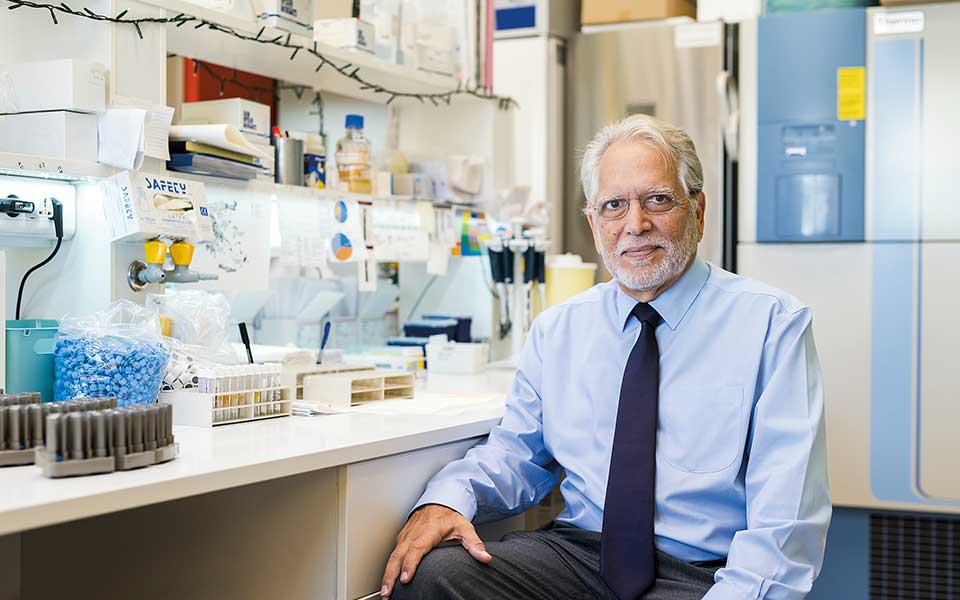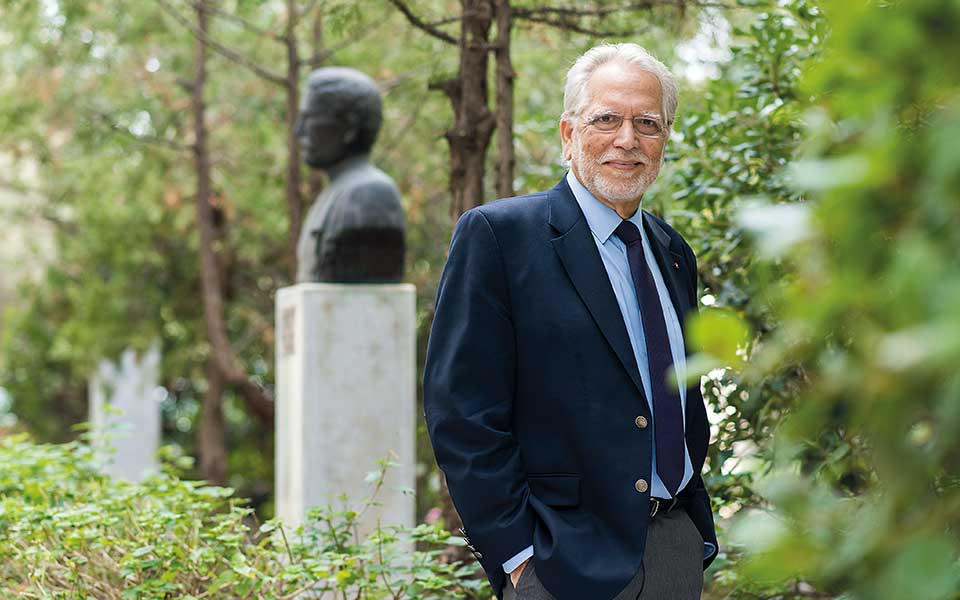Οnce, as a small child growing up in Patra, George Chrousos came very close to dying and was saved by the family doctor who made a house call to treat him. It was the late 1950s and, playing with some boys in the neighborhood, he had suffered a bad cut on his face from an old German bayonet. Infection set in and, if he hadn’t been treated promptly with penicillin, a drug newly introduced to Greece, he might well not be alive today. He tells me this as we talk almost six decades later at Aghia Sofia Children’s Hospital in Athens, Greece’s biggest university hospital pediatric clinic, which he headed until just a few months ago.
George Chrousos is a professor of pediatrics and endocrinology, and has held the UNESCO Chair for Adolescent Medicine since 2010. Before returning to Greece in 2001, he was the director of the Pediatric and Reproductive Endocrinology Branch of the Eunice Kennedy Shriver National Institute of Child Health and Human Development (NICHD) in Bethesda, Maryland, and a professor of pediatrics, physiology and biophysics at Georgetown University, Washington, DC.
He has received worldwide recognition for his research on the physiological and molecular mechanisms of stress, and on the diseases of the hypothalamic-pituitary-adrenal axis (HPA). According to both the Institute of Scientific Information and Google Scholar, which measure the number of searches for scientific articles and publications, he is the most cited clinical pediatrician or endocrinologist in the world and is listed among the 100 most-cited scientists worldwide.
After so many years of international recognition in the field of science, and having now permanently returned to Greece, do you feel that your Greek background played a role in your successful career path?
I consider myself as a Greek citizen of the world, and the US as my scientific homeland. As a Greek, I have always had a keen passion for philosophy and history, and I relate everything I read to medicine. When I began to focus on stress, I wanted to study its history in other, older societies at the same time. In 2011, I was appointed to the Kluge Chair in Technology and Society at the Library of Congress in Washington, where I discovered and collected a vast bibliography on the subject.
I discovered that the need to find a cure for stress has been very prominent since the beginning of the history of humankind. In the ancient Greek and Roman world, three philosophical currents for stress management were developed, by the Stoics, the Sceptics and the Epicureans, who even went as far as to speak about a “cure for the soul.” The psychotherapy we use today for cases of stress, anxiety or depression is called cognitive-behavioral therapy, and it has its roots in the philosophical schools of ancient Greece.
What are the findings of your research regarding stress management?
Exercise, a diet of high nutritional value, a regular daily routine, and good sleep are among the sine qua non. It’s far easier to enjoy a good psychological state if you’ve slept well! Beyond this, studies have shown that stress can be managed more effectively by those who have a more philosophical outlook on life. Do you know who lives more than 100 years? Those who can control their baser instincts and regulate their emotions. In the past few years, we’ve studied more than 450 centenarians in the Attica region.
On average, they were never overweight, hadn’t suffered bouts of clinical depression, ate a healthy diet and led lives of impressive regularity. Several of them had seen their children predecease them. Yet they’d say stoically, “What can you do? It was God’s will to take them.” Human beings are the only creatures to have developed a formidably complex prefrontal cortex, which can exert control over instincts, impulses and emotions, stimulate hope and assist in the attainment of a sense of well-being, of a lasting state of happiness.
Can someone train their brain to feel better?
Of course. As human beings, we can harness the systems of our brain that control stress and the emotions by means of philosophy, psychotherapy, meditation or prayer. All religions, irrespective of how dissimilar they may seem, inherently contain the necessary “ingredients” conducive to a better and happier life. Isn’t Buddhism a way of managing stress? Isn’t meditation and prayer the monks’ way of doing the same? Doesn’t Sufist mysticism claim to do the same for Muslims?
We could become a hub for the study and teaching of wellbeing, more specifically of eudaimonia, a Greek word, both in its original sense as defined by Aristotle, and in its current usage in modern English.

© Thalia Galanopoulou
Have you arrived at a conclusion as to what constitutes happiness?
Aristotle said that in order to be happy, one must be good. Plato and Epicurus used to say that happiness (eudaimonia) could only be achieved by following a path of virtue and wisdom. One must have attained a certain maturity, gained a certain amount of experience and wisdom, and have the ability to regulate one’s emotive side and one’s instincts. You need to feel a sense of contentment that in your life you’ve tried your best to give to those around you. I personally believe that Epicurus had reached the highest point of human wisdom. Nietzsche used to say that we haven’t progressed a single step beyond Epicurus.
The link between mind and body and its effect on health is being studied at medical institutions everywhere. Does Greece have something to contribute to the world community today as regards this issue?
Greece can and does still contribute quite a lot. First of all, Greece carries out and often generates more scientific research than what would normally correspond to its population. One of the new postgraduate programs that we have introduced revolves around the science of stress and the promotion of health through a knowledge of the basic principles of biology. I’m surprised that there isn’t a comparable postgraduate module anywhere else in the world, and I’m currently in discussion with the University of Oxford regarding the possibility of setting up a similar program there.
Greece was and still is a beacon of philosophy and well-being. We could become a hub for the study and teaching of wellbeing, more specifically of eudaimonia, both in its original sense as defined by Aristotle, and in its current usage in modern English. We possess the right climate, conditions and environment, the necessary human resources, and a spectacular quotient of history. As Epicurus used to argue, we only get to live once. He entreated us to enjoy this one time. And by enjoyment, he did not mean food or sex, especially given how frugal he was in his own lifestyle – he only ate bread and olives, and, very occasionally, cheese. It is perfectly clear that he meant the kind of eudaimonia, the kind of happiness and pleasure, that can be achieved by developing good habits and by following the path of a virtuous life. True happiness comes from the meaning that life can hold for each of us, a meaning that we must each seek for ourselves.
How does one discover the meaning of one’s life?
It requires a lot of searching and self-reflection. We each have our own, different meaning. Yet we all have the responsibility to seek our life’s true meaning. And, of course, the act of giving to others is in itself the very meaning of life. A doctor has no need for any other kind of meaning in life, in my view, except for the substantial contribution to his fellow human beings that he can make through his profession. Bertrand Russell used to say that scientists and artists were the happiest people. Why? Because the pursuit of truth and the practice of the arts are by themselves contributions to our fellow human beings.
Have you yourself discovered the meaning of life?
Yes, I’ve found the meaning of my own life. I like to study and investigate the evolution and development of human beings, and to use this knowledge in order to help my fellow men.
Why did you decide to return to Greece after such a long and successful professional career and a comfortable private life in the US?
I like Greece and I’m Greek. The world here is vibrant. There’s a certain polymorphy and diversity, a distinct sense of humor and a feeling of solidarity. I do, of course, go back to the US often, not only to carry out scientific research and to teach, but also because two of my daughters and my grandchildren live there.
As a scientist, which factor do you think played the most significant role in your own development? Heredity or the environment in which you grew up?
I do believe that heredity was good in my case. But I also had an exceptional mother, who gave me her attention from very early on. She taught me how to read and write when I was three years old, and she inspired in me a love for books and knowledge. I read constantly and continue to learn even today.
Plato used to say that the virtues of education should be cultivated in children first of all. We know today that our brains begin to develop synapses, that is to say nerve circuits, very rapidly during the last three months of pregnancy, a process that reaches its peak at around the time of a child’s second year of life; that children have an already developed “moral intelligence” at four; and that most of the higher functions of the brain have been fully developed by the age of five. The conclusion is that if we wish to influence our society towards a more positive state of things, we need to start from a very early stage. Besides, there are socioeconomic studies that prove that a healthy pregnancy and a good early years education yield more benefits to society than school and post-secondary education.












